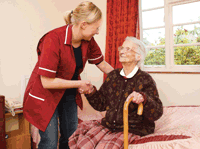
Extra care housing delivers better outcomes at less cost than residential care for people with the same needs, an independent report is expected to conclude next month.
A draft evaluation of 19 Department of Health-funded extra care housing schemes, seen by Community Care, found extra care can improve older people’s health and well-being and offer them improved choice and independence.
While extra care was a cheaper option than residential care for people with similar levels of need, with average costs at £374 a week compared to £409 a week, it also achieves better outcomes, the report is expected to say.
The study, by the Housing Learning & Improvement Network (Housing LIN) and the University of Kent’s Personal Social Services Research Unit, is also expected to say that extra care can help reduce emergency hospital admissions – saving millions for both the NHS and social care.
However, to roll the model out across the country councils will need the NHS and housing providers to think more strategically to encourage more choice in housing with care options.
Housing LIN director Jeremy Porteus said this would include a shift in mindset among councils.
“Care and support should be shaped around people’s lifestyles and housing choices – not the other way round,” he said.
The evaluation studied the impact of the DH’s £227m extra care housing fund, which funded schemes from 2006-8 to pump-prime the market.
It followed more than 900 people who entered extra care over a 30-month period and contrasted these with two studies of people in care homes in 1995 and 2005.
The findings are expected to show extra care residents had a slight improvement in physical functioning six months after moving in, while cognitive functioning remained stable. This contrasted with slight declines in both physical and cognitive functioning among residents with similar needs in care homes.
Death rates were lower within 30 months of moving in than for those moving into residential care and residents were happy with the independence, security and sense of community provided in their new homes.
Alongside the report, Housing LIN and the Association of Directors of Adult Social Services will publish a pack containing practical tools to help local authorities, health organisations, providers, funders and developers deliver extra care housing.
What is extra care?
Extra care housing aims to meet the housing, care and support needs of older people, while helping them to maintain their independence in their own private accommodation. It combines purpose-built housing for older people with onsite flexible care that adapts to residents’ changing needs and allows them to retain their independence.
What do you think? Join the debate on CareSpace
Keep up to date with the latest developments in social care. Sign up to our daily and weekly emails
Related stories
Jeremy Porteus on extra care housing
Extra care housing ‘delivers better outcomes than home care’Housing 21 report: trained staff become more sensitive to tenants wishes
Extra Care and older people: Jill Manthorpe reviews two pieces of research


 Bournemouth, Christchurch and Poole
Bournemouth, Christchurch and Poole  Hampshire County Council
Hampshire County Council  Lincolnshire County Council
Lincolnshire County Council  Norfolk County Council
Norfolk County Council  Northamptonshire Children’s Trust
Northamptonshire Children’s Trust  South Gloucestershire Council
South Gloucestershire Council  Wiltshire Council
Wiltshire Council  Wokingham Borough Council
Wokingham Borough Council  Children and young people with SEND are ‘valued and prioritised’ in Wiltshire, find inspectors
Children and young people with SEND are ‘valued and prioritised’ in Wiltshire, find inspectors  How specialist refugee teams benefit young people and social workers
How specialist refugee teams benefit young people and social workers  Podcast: returning to social work after becoming a first-time parent
Podcast: returning to social work after becoming a first-time parent  Podcast: would you work for an inadequate-rated service?
Podcast: would you work for an inadequate-rated service?  Family help: one local authority’s experience of the model
Family help: one local authority’s experience of the model  Workforce Insights – showcasing a selection of the sector’s top recruiters
Workforce Insights – showcasing a selection of the sector’s top recruiters 

 Facebook
Facebook X
X LinkedIn
LinkedIn Instagram
Instagram
Comments are closed.